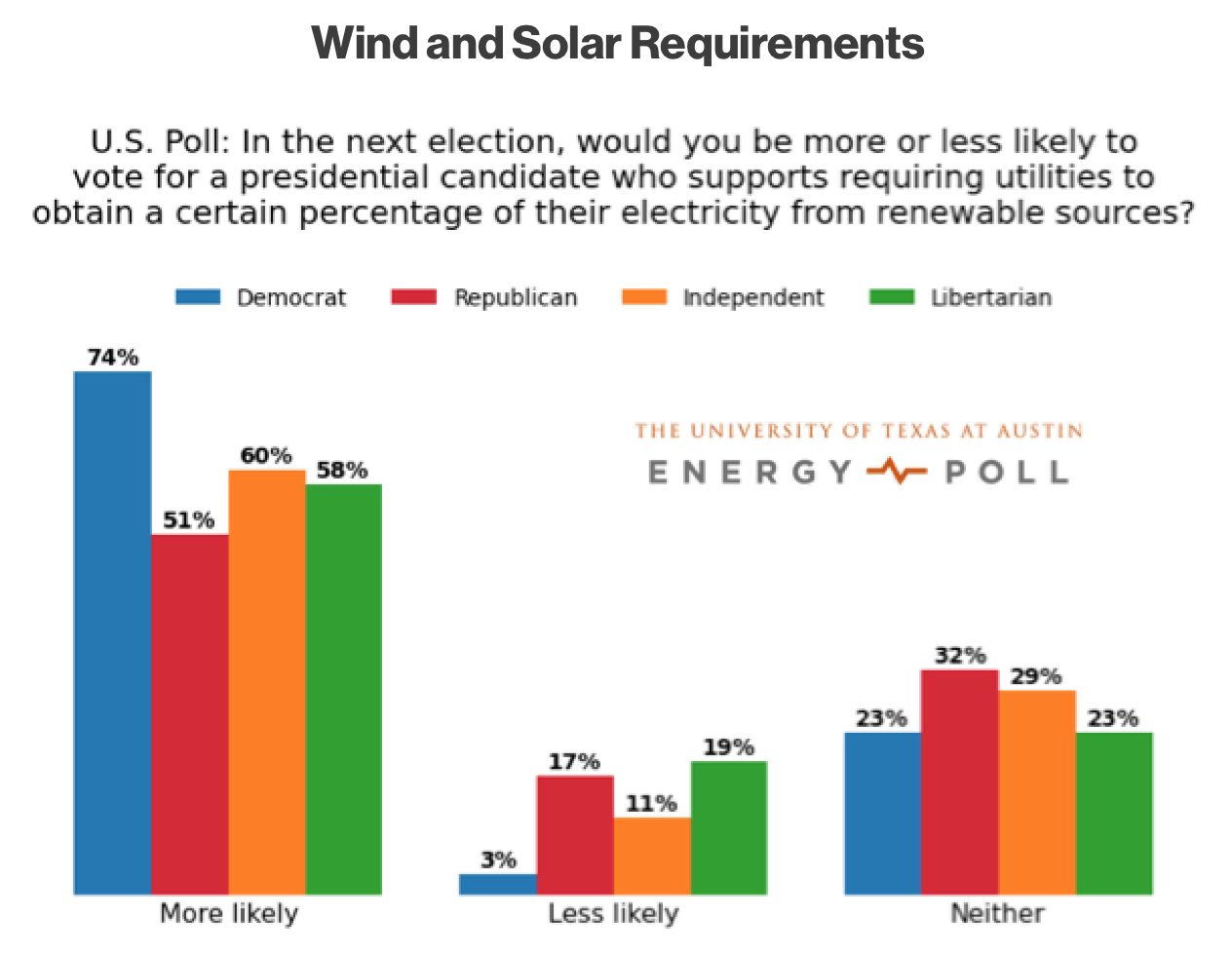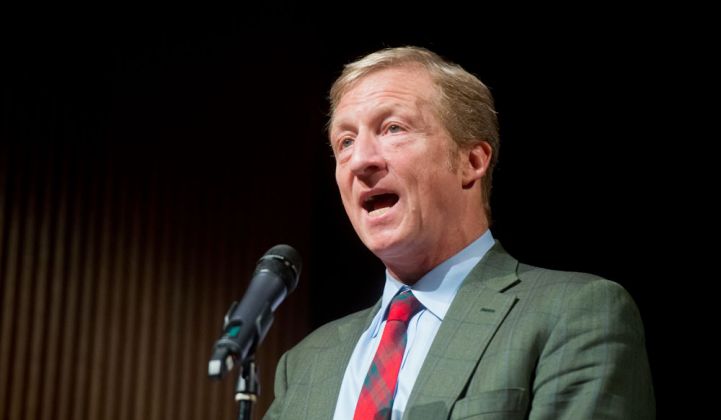Tom Steyer’s super PAC NextGen Climate launched an aggressive campaign this spring against Republican presidential candidates who deny the existence of man-made climate change.
Steyer spent more than $70 million to defeat Republican candidates in last year’s midterm elections, and has pledged to spend “what it takes” to elect candidates that will act on climate issues in 2016.
But NextGen’s actions haven’t been entirely confrontational. The PAC recently expressed support for New Jersey Gov. Chris Christie and former Florida Gov. Jeb Bush when the two Republican presidential hopefuls acknowledged that humans play some role in causing climate change.
Steyer also took a conciliatory tone yesterday at an energy and environment conference hosted by GreenBiz.
“In order to win [on climate] nationally, we have to appeal across the aisle, which we are,” said the billionaire, speaking on a panel with CNN contributor Van Jones at Verge in San Jose, California.
During tonight’s Republican presidential debate, the group will attempt to garner more support from conservative candidates by running a new six-figure national ad on CNBC calling for the next president to lay out a plan to achieve a 50 percent clean energy mix in the U.S. by 2030.
“That is a very specific request we’re making of every candidate, regardless of party,” Steyer told Greentech Media after his keynote address. “We’re going to ask everyone, because we feel it’s time to be specific. Good intentions are not going to get it done.”
The Democratic candidates have come out with strong clean energy policies. Former Maryland Gov. Martin O’Malley has even proposed to ending fossil-fuel use by 2050.
Meanwhile, front-runner presidential candidates Donald Trump, Ben Carson and Marco Rubio remain staunchly opposed to mainstream climate science and have expressed little to no support for clean energy -- a position that appears to be increasingly out of step with public opinion.
According to a recent survey by Republican pollsters, 54 percent of self-identified “conservative Republicans” said they believe the climate is changing and that humans are likely a contributing factor.
An even stronger majority of conservative Republicans expressed support for rooftop solar and net metering, with 62 percent of respondents saying homeowners with rooftop solar should be credited for sending extra power back to the electrical grid.
A separate poll released last week by the University of Texas at Austin found that 51 percent of Republicans are more likely to vote for a presidential candidate who supports requiring utilities to get a percentage of their electricity from renewable sources. The same poll found that 59 percent of Republicans now believe climate change is happening, up from 47 percent just six months ago.
In a victory for bipartisan climate action, New Hampshire Republican Senator Kelly Ayotte came out in support of the EPA Clean Power Plan this week after speaking with members of the business community that vocally supported the plan, including Smuttynose Brewing Company, Timberland and Worthen Industries.

Businesses play a pivotal role in generating political support for clean energy policies like the Clean Power Plan, according to Steyer.
Almost all Fortune 500 companies, with the exception of fossil-fuel companies, are already on board with climate action, he said. Most of these companies have internal sustainability plans, and many are already benefiting from low-cost, low-emission renewable energy projects. At the same time, the impact businesses have on political leaders through lobbying efforts is arguably greater than ever before.
“I think it’s really important for businesspeople to speak out that costs [for clean energy] are at a place where we can do it, technology is at a place where we can do it, and it will only get better,” Steyer said.
Van Jones, CNN commentator and green-jobs champion, called on companies looking to buy and sell more clean energy products to also engage with marginalized communities as they push for stronger clean energy policies.
“The more people you engage on the front end, the more support you’ll have on the back end,” said Jones, who leads Green for All, a nonprofit that advocates for people of color in the climate movement.
Fostering stakeholder cooperation will benefit underserved communities, while mitigating the worst effects of climate change, he said. It will also open up new market opportunities for businesses and garner political support for their work.
Any company that figures out how to make renewable energy and energy efficiency more accessible for underserved Americans, and goes to their political leaders with that idea, “will get all kinds of help,” Jones said.
Some solar companies, such as Grid Alternatives and PosiGen, have been targeting underserved communities for years. Other companies, such as SolarCity, are now following suit.
For the NAACP, access to clean energy is a civil rights issue. The low-income communities the group represents stand to benefit from lower energy prices, cleaner air, and more plentiful employment opportunities, and are often disproportionately affected by extreme weather events linked to climate change. The NAACP has come out in strong support of the solar industry, backing policies for solar gardens, community aggregation, and virtual and traditional net metering.
Governments have started to respond to these efforts.
In July, New York launched the Shared Renewables Program under the Reforming the Energy Vision effort, as a means of bringing community solar to low-income neighborhoods. California, which directs funds from its carbon market to disadvantaged communities, recently passed a landmark climate law that requires regulators to conduct a comprehensive study on renewable energy adoption by low-income customers by the end of next year.
Policymakers are also targeting underserved communities at the national level. This summer, the White House announced a goal to install 300 megawatts of renewable energy on subsidized housing and new financial commitments to scale up clean-energy adoption among low- and moderate-income households. The EPA has incentivized states to pursue energy-efficiency projects for low-income customers under the final version of the Clean Power Plan.
“My dream is for everyone to decide -- regardless of party, regardless of geography, income level or ethnicity -- we will solve [climate change] together,” said Steyer. “I see this as a huge national opportunity to redefine who we are and break down divisions I think are so negative.”



